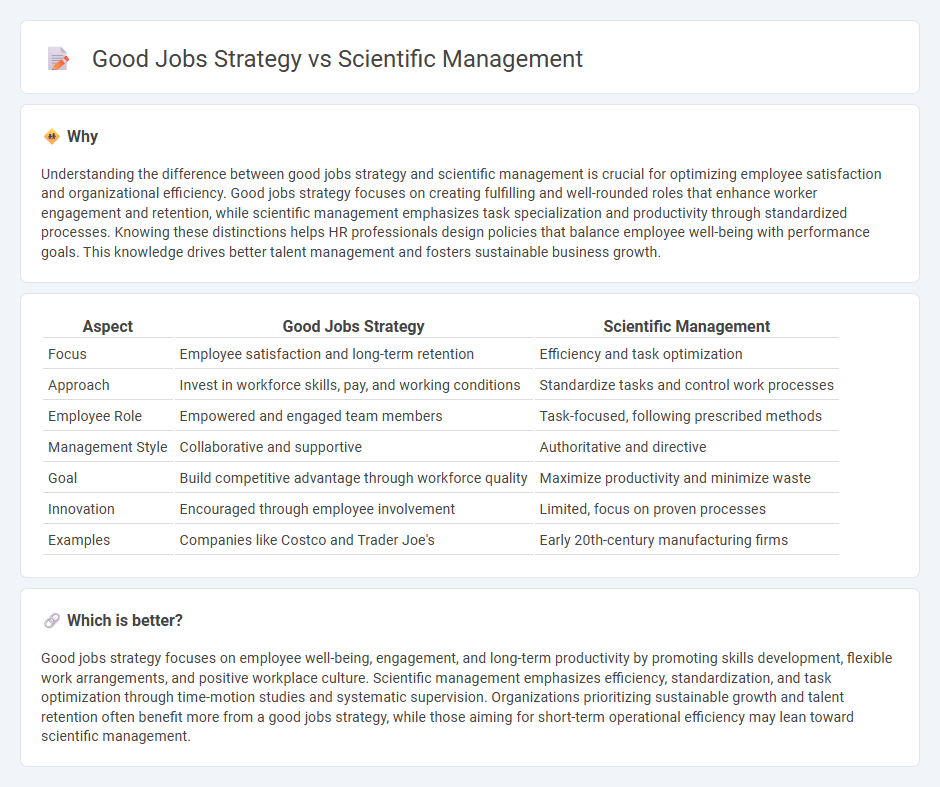
Effective human resources strategies focus on employee engagement, development, and aligning workforce capabilities with organizational goals to drive productivity and retention. Scientific management, pioneered by Frederick Taylor, emphasizes task optimization and efficiency through time and motion studies, often prioritizing processes over people. Explore how combining these approaches can enhance organizational performance and employee satisfaction.
Why it is important
Understanding the difference between good jobs strategy and scientific management is crucial for optimizing employee satisfaction and organizational efficiency. Good jobs strategy focuses on creating fulfilling and well-rounded roles that enhance worker engagement and retention, while scientific management emphasizes task specialization and productivity through standardized processes. Knowing these distinctions helps HR professionals design policies that balance employee well-being with performance goals. This knowledge drives better talent management and fosters sustainable business growth.
Comparison Table
| Aspect | Good Jobs Strategy | Scientific Management |
|---|---|---|
| Focus | Employee satisfaction and long-term retention | Efficiency and task optimization |
| Approach | Invest in workforce skills, pay, and working conditions | Standardize tasks and control work processes |
| Employee Role | Empowered and engaged team members | Task-focused, following prescribed methods |
| Management Style | Collaborative and supportive | Authoritative and directive |
| Goal | Build competitive advantage through workforce quality | Maximize productivity and minimize waste |
| Innovation | Encouraged through employee involvement | Limited, focus on proven processes |
| Examples | Companies like Costco and Trader Joe's | Early 20th-century manufacturing firms |
Which is better?
Good jobs strategy focuses on employee well-being, engagement, and long-term productivity by promoting skills development, flexible work arrangements, and positive workplace culture. Scientific management emphasizes efficiency, standardization, and task optimization through time-motion studies and systematic supervision. Organizations prioritizing sustainable growth and talent retention often benefit more from a good jobs strategy, while those aiming for short-term operational efficiency may lean toward scientific management.
Connection
Effective jobs strategy aligns with scientific management principles by systematically analyzing tasks to enhance productivity and job design. Scientific management uses data-driven methods to optimize workflows, which informs strategic decisions on workforce allocation and skill development. This connection results in improved efficiency, employee satisfaction, and organizational performance.
Key Terms
**Scientific Management:**
Scientific Management, developed by Frederick W. Taylor, emphasizes efficiency through task standardization, time studies, and specialized labor division to optimize productivity. It prioritizes minimizing waste and increasing output by scientifically analyzing workflows and implementing precise procedures. Explore how Scientific Management principles contrast with modern Good Jobs strategies for a deeper understanding of workplace dynamics.
Task Specialization
Scientific management emphasizes task specialization by breaking complex jobs into simpler, repetitive tasks to increase efficiency and productivity in manufacturing settings. In contrast, the good jobs strategy promotes broader skill development and job enrichment to enhance employee satisfaction and adaptability in diverse industries. Discover how these approaches impact workforce dynamics and organizational success.
Time and Motion Studies
Time and Motion Studies, a core component of Scientific Management developed by Frederick Taylor, analyze workflows to improve efficiency by breaking tasks into smaller, measurable units. In contrast, the Good Jobs Strategy prioritizes employee well-being and sustainable work conditions, emphasizing job quality alongside productivity without solely focusing on task optimization. Explore how these methodologies balance efficiency and employee welfare for comprehensive operational success.
Source and External Links
Scientific management - Wikipedia - Scientific management is a theory devised by Frederick Taylor aimed at improving economic efficiency through scientific analysis of workflows, focusing on scientific job study, worker selection and training, and cooperation between managers and employees.
Scientific Management in Organizations | EBSCO Research Starters - Scientific management breaks down jobs into component tasks to find the most efficient methods, emphasizing principles such as chain of command, unity of command, span of control, specialization, and clarity of responsibilities.
What is Scientific Management? - Pitch Labs - Scientific management uses observation, experimentation, and evaluation to optimize how tasks are performed, pioneered by Frederick Taylor who promoted efficiency and fair pay through his scientific approach to managing work.
 dowidth.com
dowidth.com